
A relentlessly seeking, sensitive, intellectual soul, Tagore wanted to drink the elixir of life to the dregs. He found beauty in everything around him. Even the minuscule objects of daily life filled him with delight. The Sufi minstrel within him, seeks the Divine amidst nature, opines Ruchira, in the Special Feature. A Different Truths exclusive.
Tagore was a versatile personality; a many-faceted gem that illumined the entire world with its radiance. In fact, there is hardly any aspect in the entire gamut of human existence which he left unexplored, untouched in his writings.
A relentlessly seeking, sensitive, intellectual soul, Tagore wanted to drink the elixir of life to the dregs. He found beauty in everything around him. Even the minuscule objects of daily life filled him with delight: be it the tiny dew drop on an ear of paddy (ekti dhaaner shisher upor ekti shishir bindu) or the black bumble bee that ambles in through the open window of a room (gharete bhromor elo gunguniye) or the effulgent sun that rises from the eastern horizon (Oi Pohailo TimiroRaati ) all of these left him enthralled.
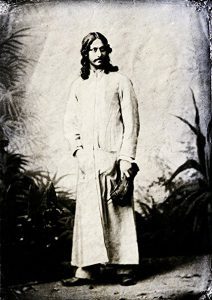 Indeed, Rabindranath was fortunate to behold Mother Nature in her bewitching glory and splendour. For a considerable length of time, young Rabi had to sojourn in the family’s estates located in serene, verdant, idyllic villages namely Kushtia, Shilaidaha, Shahjadpur, et al situated in the picturesque countryside of modern Bangladesh. He was mesmerised by the unparalleled beauty that he saw all around him. He captured this beauty in his poems and fictional works.
Indeed, Rabindranath was fortunate to behold Mother Nature in her bewitching glory and splendour. For a considerable length of time, young Rabi had to sojourn in the family’s estates located in serene, verdant, idyllic villages namely Kushtia, Shilaidaha, Shahjadpur, et al situated in the picturesque countryside of modern Bangladesh. He was mesmerised by the unparalleled beauty that he saw all around him. He captured this beauty in his poems and fictional works.
Most significantly, it was this exposure and proximity to nature that greatly inspired Tagore and moulded his ideas on spiritualism and divinity. Even as he wallowed in nature’s beauty, the adolescent was awestruck by the Divine creator whose dexterous hands shaped the infinite beauty around him. To his young mind, the Creator was inseparable from his abundant creations. Realisation dawned on him that the Divine manifests Himself in each and every part of His handiwork: Nature, flora, fauna, the solar system, and the Universe, not forgetting his most amazing creation, man. If one were to think deeply and elevate his emotions, thoughts, and feelings to a higher level – beyond this gross, mundane world – he too would realise that the microcosm (lives of mortals) and the macrocosm (Nature and Universe) were two sides of the same coin.
Interestingly, this trend of thoughts forms the crux of Sufism. Undoubtedly, Tagore had imbibed Sufism within his soul and his psyche. The Sufis firmly believe that there is one Truth. We human beings are all integral to the Truth. It is the realisation of this Supreme Truth that crafts and shapes the concepts of our physical existence, our mutual relationships, attitude and outlook towards life and the world among many others. Yet another pivot point of Sufism is Love, which transcends barriers of time, space and crass realities of worldly existence. It is only by means of an all-pervasive cosmic love that one can comprehend the Divine being. Nothing can be achieved sans love. When a devotee’s emotions reach a crescendo, the demarcating lines are blurred; at this juncture the (mortal) lover and the (immortal) beloved mingle, blend with one another. Out of this ecstatic union, there arises a mega consciousness and formless existence. And that unique existence is a fusion of unbounded, unconditional love, eternal bliss, and joy.
Many a distinguished scholar has hailed Tagore as a Sufi par excellence. They could not be more right. 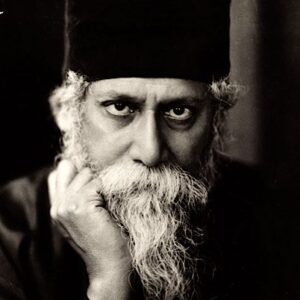 Throughout the vast spectrum of his literary works, especially his poems, nowhere does Tagore invoke God in the cloistered atmosphere of a temple or a shrine. The Sufi minster within him, seeks the Divine amidst nature – verdant meadows, gurgling brooks, grassy forest glades, the glorious sunrise, flamboyant sunset, backyards carpeted with blossoms shed by trees, unpaved dirt roads, azure sky, violent gusts of wind, torrential downpours accompanied by thunderclaps and what have you. These only go to show that divinity is palpable everywhere.
Throughout the vast spectrum of his literary works, especially his poems, nowhere does Tagore invoke God in the cloistered atmosphere of a temple or a shrine. The Sufi minster within him, seeks the Divine amidst nature – verdant meadows, gurgling brooks, grassy forest glades, the glorious sunrise, flamboyant sunset, backyards carpeted with blossoms shed by trees, unpaved dirt roads, azure sky, violent gusts of wind, torrential downpours accompanied by thunderclaps and what have you. These only go to show that divinity is palpable everywhere.
Nor do we find the Poet going down on his knees before the altar or throne where the deity reposes. Instead, his soul calls out to the divine presence in a highly endearing tone viz., Praner Manush (alter ego), Priytomo (most beloved), Paran Sakha (friend of my life), Ohe Sundara (the Magnificent One), Nath (Lord), and such like.
Let us take a look at some of the sterling qualities, which the Poet attributes to the Divine One:
Satya Mangala Prema maya Tumi
Dhrubo Jyoti Tumi Andhakaare….
(Thou art the Truth the Benevolent One and the Embodiment of Love. Thou art the Pole Star lighting up my darkened path)
Or consider this:
Tahare arati kare chandra tapan deb manab bande charana
Ashin shei biswa sharana taar jagat mandire
(The Eternal One resides in His temple i.e., the earth, the sun and the moon are the glowing lamps of worship, the deities and the mortals offer Him oblations)
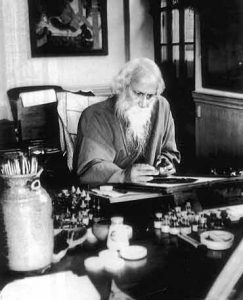 Upon carefully browsing through Tagore’s compositions one perceives that all points of time, the mortal and the divine, the lover and the beloved are never far from each other. And even if they are, the mortal appears to be yearning for his beloved’s company. Soul stirring phrases such as Nishitho shayane bhebe raakhi monay ogo antaryami (Before retiring for the night I think of Thee, O Omniscient one),Amaar milon laagi tumi ashcho Kobe theke (Since eternity Thou cometh for our union), and Kobe ami bahir holem tomari gaan geye(Down the ages I traverse life’s path, singing Thy praise) are but a few examples.
Upon carefully browsing through Tagore’s compositions one perceives that all points of time, the mortal and the divine, the lover and the beloved are never far from each other. And even if they are, the mortal appears to be yearning for his beloved’s company. Soul stirring phrases such as Nishitho shayane bhebe raakhi monay ogo antaryami (Before retiring for the night I think of Thee, O Omniscient one),Amaar milon laagi tumi ashcho Kobe theke (Since eternity Thou cometh for our union), and Kobe ami bahir holem tomari gaan geye(Down the ages I traverse life’s path, singing Thy praise) are but a few examples.
There is also a strong element of Wanderlust interpolated into Tagore’s Mysticism. It is this wanderlust that draws the Bard from within“narrow domestic walls” out in the open. He yearns to traverse the great, wide, beautiful world. His mission is two-pronged: One, imbibe the ethereal beauty into his innermost self, and Two, a quest of the Omnipresent being. At this juncture immortal lines like Mahabiswe mahakashe, mahakaal majhe, ami manab ekaki bhromi bismaye, or Bhenge more gharer chabi niye jaabi k amaare and /or Gramchhaara oi ranga matir (red soil) poth, come to mind.
Finally, when the journey of life draws to a close, the poet pleads with his Divine companion to act as navigator of the ship that will ferry his soul – across the sea of tranquillity – into the other world.
Yet again, he cries aloud, O my beloved friend I behold Thee, poised beyond the frontiers of life and death…Eagerly I lunge forward to get closer to Thee…
Summing up, the poet Tagore’s equation with the Divine and the Infinite was incredible.
Photos from the Internet
#Tagore #Divinge #SufiTagore #MysticimAndTagore #TributeToTagore #DifferentTruths

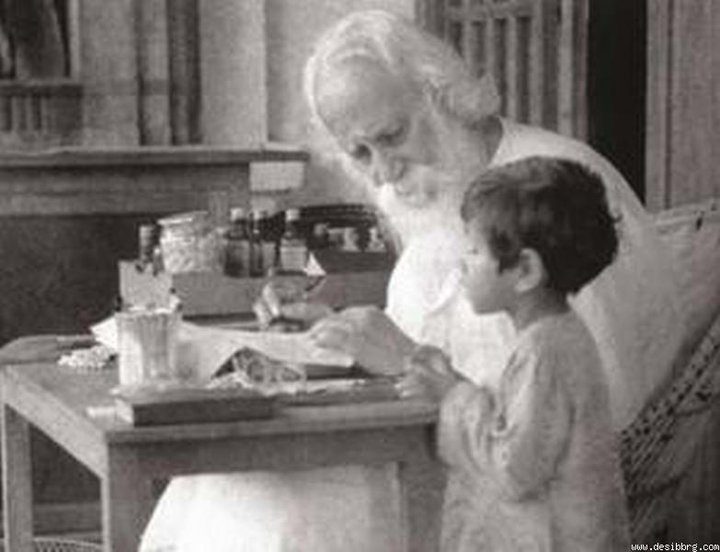


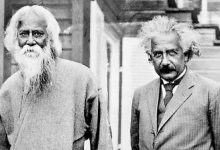

 By
By
 By
By
 By
By
 By
By